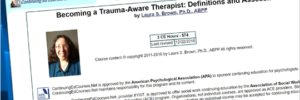In addition to providing cutting edge, evidence based trauma therapy, how can mental health practitioners living and working within oppressive systems (like colonialism, patriarchy, white supremacy, heterosexism, or exploitative capitalism) ensure we’re less likely to perpetuate the harms of these systems through our therapy? How can we educate ourselves to support the empowerment and healing… Read more »
Posts Tagged: ce-credit
Decolonial, liberatory, intersectional feminist therapy: The next step on the path (August 2021-August 2022, On-Demand)
Feminist therapy has, in essence, argued that the entire project of psychotherapy was colonized and corrupt from its inception. The collusion of the “founding fathers” of western psychotherapy with both overt and covert moves by governments to control the behaviors of marginalized persons, as well as reinforce dangerous false narrative of toxic masculinity, are core… Read more »
Dealing with vampire clients and surviving the encounter (April 9, Zoom)
This presentation is part of a day-long pre-conference workshop, Navigating issues of boundaries and ethics in the psychotherapy of trauma and dissociation. In my portion of this workshop I talk about a typology of destructive individual, either a colleague or a client, who I have come to describe as a “Vampire” due to their pervasive,… Read more »
Your turn for care: Surviving the aging and death of the adults who harmed you (January 30, Zoom)
The adult family members who harmed survivors of childhood complex trauma can present new difficulties and dilemmas for survivors when those perpetrators grow old. Demands on the survivors to engage in caregiving, even when refused, can activate what had been previously healed wounds or open new ones. This workshop will address the common concerns of… Read more »
Not the price of admission: Having healthy relationships for trauma survivors in the pandemic era (January 30, Zoom)
This workshop will offer participants insights into two things. One, why survivors believe, consciously or not, that they must pay a price in order to have any kind of relationship with other humans. And two, how to stop paying prices and instead develop a template for the healthy relationships that we deserve with friends, co-workers,… Read more »
Psychotherapy with alien beings: Cultural competence (and incompetence) in psychotherapy practice
This article is a whimsical introduction to the core components of my model of how to be a culturally humble, and possibly competent, psychotherapist as we work with people in the context of their, and our, intersectional identities. In this piece I discuss the problems with the now out-moded “how to treat an alien being”… Read more »
Liberatory counseling in challenging times: How can counseling centers show Institutional Courage (February 20, Evanston IL)
This keynote address will discuss how counseling center therapists, and the systems that support their work, can function in liberatory ways in their work. The questions of divided loyalties – to the university, to the counseling center’s own systems of hierarchy, to staff, to trainees, and to clients – will be considered. I’ll talk about… Read more »
Not the price of admission: Having healthy relationships for trauma survivors (February 8, Orlando FL)
This workshop for adult survivors of complex childhood trauma and their therapists will introduce the “Price of Admission” model for how disrupted attachment during childhood creates problematic paradigms for all kinds of emotionally meaningful relationships in adult life. I will then talk about ways to break the chain of trauma reenactments in those relationships, emphasizing… Read more »
Cultural competence: It’s all about clinical awareness (December 6, Tukwila WA)
This brief workshop for interns and post-docs who are part of the National Internship Training Consortium in the Pacific Northwest, will invite early career psychologists to consider how they and their work are affected by systemic forms of bias and oppression. We will utilize a model of developing cultural humility and compassionate self-awareness to move… Read more »
Ethical and practical applications of Aikido principles to trauma treatment (November 8, Seattle WA)
This workshop for therapists who treat trauma survivors will introduce the use of concepts and movement strategies from Aikido, the martial art of peace. We will base our work on current findings about the neuroscience of trauma, and focus on interventions that affect the polyvagal system and the stress response system. The relational nature of… Read more »
Cultural competence and cultural humility in the treatment of trauma (September 27, Arlington TX)
This workshop will address two issues central to working with psychotherapy clients; how do we demonstrate cultural humility, so at to move toward greater competence, and how do we integrate that cultural awareness into the treatment of trauma survivors? Since so many people entering treatment have histories of trauma, both childhood complex developmental trauma and… Read more »
Blending science and art in trauma therapy outcomes (August 9, Chicago IL)
This symposium brings me together with a group of other long-time practitioners in the field of trauma psychology. Together, we will discuss our responses to a number of questions about what make trauma therapy work, including describing our start in the trauma therapy field, discussing some trends in the science world at the time you… Read more »
Contextual trauma therapy for clients with complex trauma: Skill-building using a video recording (August 8, Chicago IL)
I will be a discussant on this workshop in which members of the Nova Southeastern University trauma treatment program discuss the latest developments in their work – in this case, looking at how and whether skills at coping with trauma-related difficulties can be enhanced through the use of video material. Where to attend Event: Annual… Read more »
Helping trauma survivors to have the relationships they deserve (December 9, Burlingame CA)
Survivors of complex childhood trauma – systemic abuse, neglect, and disrupted attachment schemata — enter adulthood with internal working models of relationship that often lead them into difficult and painful connections with others. I will address the specific challenges in empowering these survivors to stop “paying the price of admission” to intimacy, and discuss how… Read more »
Liberatory Models of Psychotherapy Supervision (December 8, Burlingame CA)
There is a dynamic tension between the necessarily hierarchical structure of psychotherapy supervision and the liberatory/egalitarian models of feminist and other liberatory practices. This will be a chance for psychotherapy supervisors who are struggling with this dilemma to discuss this topic with the author of The feminist model of psychotherapy supervision. Come with your own… Read more »
Increasing cultural humility as a path to competence (December 8, Burlingame CA)
This session will be a dialogue between me and Elliott Connie, a psychotherapist who has been instrumental in promoting diversity issues in the world of Brief Therapy. We will engage with one another and with the audience – come prepared to participate. Where to attend Event: Brief Therapy Conference 2018 Sponsoring organization: Milton Erickson Foundation… Read more »
Culturally competent trauma practice (December 7, Burlingame CA)
Just as human beings are not generic, so, too, trauma is an event that is affected by and interacts with people’s intersectional identities. This workshop will introduce participants to a mindful model for understanding how to move towards cultural competence in practice with trauma survivors. We will pay particular attention to therapist countertransference/fragility, and to… Read more »
The feminist therapy model of psychotherapy supervision (June 27 Amsterdam The Netherlands)
This presentation, part of a symposium of master supervisors, will consist of a brief didactic review of the feminist model of psychotherapy supervision followed by excerpts from a DVD of a live session of supervision in which this model is demonstrated. We will focus on ways in which the feminist emphasis on power analysis and… Read more »
Culturally competent trauma treatment (October 13, Seattle WA)
This full-day workshop will focus on self-awareness of the therapist’s own intersecting strands of identity, cultural norms and biases and the ability to be sensitive to the nuances of human difference. This model of cultural competence is inherently integrative in that it focuses on people, not theories, and on distress, dysfunction, strength and resilience, not… Read more »
How can we engender healthy relationships for survivors of complex childhood trauma? (August 25, Bellevue WA)
This keynote address will introduce participants to the “Price of Admission” model for analyzing problematic relationship patterns found in adult survivors of childhood complex trauma. We will explore how to utilize EMDR, both trauma processing and resource development strategies, as a means of achieving the goal of having healthier emotionally meaningful relationships for adult survivors…. Read more »
The feminist therapy model of psychotherapy supervision (June 16, Dublin Republic of Ireland)
This presentation, part of a symposium of master supervisors, will consist of a brief didactic review of the feminist model of psychotherapy supervision followed by excerpts from a DVD of a live session of supervision in which this model is demonstrated. Both the supervisor and the supervisee will be present to comment on the experience… Read more »
Assessing trauma in the forensic context (April 30, Pasadena CA)
Although trauma is implicated in a large percentage of cases that appear in the office of forensic practitioners, very few forensic psychologists appear to be aware of how to consider its effects in choosing assessment tools, developing standard interview protocols, or analyzing findings. Assessment of the effects of psychological trauma is not limited to assessment… Read more »
Cultural competence in trauma treatment: Beyond symptoms to the context and the person (March 3-4, Sydney NSW Australia)
The experience of psychological trauma is one that affects humans on somatic, intrapsychic, interpersonal, and spiritual/existential dimensions. Yet almost all of the literature on trauma treatment proceeds as if trauma occurs outside of the social, historical, and political contexts. A problematic consequence of this approach to work with trauma survivors is that while treatment may… Read more »
Your turn for care: Surviving the aging and death of perpetrators in your family (January 31, Orlando FL)
This workshop draws upon my book of the same title, and is aimed at assisting adult survivors who are confronting the complexities evoked by the aging and death of perpetrators in their families. We will cover some of the basic constructs foundational to making decisions about whether or how to participate in the care of abusive elders,… Read more »
No easy answers: Ethics and the emphasis on social justice in the practice of psychotherapy (January 15, Atlanta GA)
In this symposium I will be speaking to the specific topic of the ethics of self-care: social justice for the therapist, too. This presentation addresses the thorny ethical conundrum of psychotherapist self-care. I will frame my discussion through the lens of feminist practice and the necessity of justice for the therapist in the context of… Read more »
Your turn for care: Surviving the aging and death of perpetrators in your family (October 5, Seattle WA)
This workshop draws upon my book of the same title, and is aimed at assisting adult survivors who are confronting the complexities evoked by the aging and death of perpetrators in their families. We will cover some of the basic constructs foundational to making decisions about whether or how to participate in the care of… Read more »
What does egalitarian look like? Dynamics of empowerment in feminist practice (August 10, Washington DC)
This presentation, part of the symposium Psychotherapy Revealed: A Glimpse of Eminent Psychotherapists in Session, illustrates how I attempt to develop egalitarian relationship in therapy, using examples of my work from the APA video series. Egalitarian interactions are theorized to be at the heart of the feminist treatment model of empowerment, and can be challenging… Read more »
Eek, there’s dissociation in my office!: The art of mentoring therapists in working with dissociation (November 17, Baltimore MD)
This workshop, with co-presenter Kathy Steele, is aimed primarily at supervisors working with clinicians who are new to practice with complex trauma and dissociation. Because this novice experience may occur at different points in a therapist’s professional development, we will address both the issues inherent in working with trainees early in their career, and consulting… Read more »
Your turn for care: Assisting clients with the aging and death of perpetrators (November 16, Baltimore MD)
This workshop draws upon my book of the same title, and is aimed at assisting clinicians whose adult survivors clients are facing the aging and death of perpetrators in the family. We will cover some of the basic constructs to assist survivors with making decisions about whether or how to participate in the care of… Read more »
Self-care as a path to ethical behavior (November 15, Baltimore MD)
This presentation, part of the day-long Ethics workshop with co-presenters Phil Kinsler, Joan Golston, and Christine Courtois, will explore the particular ethical dilemmas that arise for clinicians working with clients who present with complex trauma and dissociation. My portion of the workshop will focus on how failures of therapist self-care create risks for boundary crossings,… Read more »
Feminist therapy: What empowerment looks like (August 4, Honolulu HI)
This presentation is a component of the symposium Psychotherapy Revealed—A Glimpse of Eminent Psychotherapists at Work. I will demonstrate the application of feminist therapy’s core construct of empowerment in a therapy session from the APA Psychotherapy Video Series. The client in this case was not interested in becoming empowered, and exerted strong pulls for me… Read more »
Cultural competence in trauma treatment (April 19, Oakland CA)
In this workshop I’ll be covering the basics of my mindfulness-based approach to cultural competence, and integrating that viewpoint into paradigms for working with trauma survivors. I’ll also be exploring some of the boundary challenges inherent in working with survivors, and discussing how to develop culturally competent paradigms for understanding what constitutes trauma. Where to… Read more »
Cultural competence in trauma therapy (March 1, New York NY)
In this workshop I’ll be covering the basics of my mindfulness-based approach to cultural competence, and then integrating that viewpoint into paradigms for working with trauma survivors. I’ll also be exploring some of the boundary challenges inherent in working with survivors. Where to attend Event: CE workshop ICP calendar page that includes information about this… Read more »
Recovered memory revisited (October 20, Nashville TN)
This workshop for professionals reviews the most recent research on the relationship between memory and psychological trauma. It explores the specific issues inherent in working with remembering clients and the risks to therapist and client of over-or-under response to client material. Where to attend Event: Fall Workshop Sponsoring organization: Nashville Psychotherapy Institute Date: October 20,… Read more »
Ethical and scientific issues in forensic assessment of alleged trauma (August 4, Orlando FL)
This CE workshop is an introduction to forensic assessment where allegations of trauma are central to the legal matter. Where to attend Event: 120th Annual Convention Convention page for this workshop Sponsoring organization: American Psychological Association Date: August 4, 2012 Time: 1:00 pm – 4:50 pm Room: Hilton Orlando Turkey Lake Room Venue: Orange County… Read more »
Gender as a factor in cultural competence (August 4, Orlando FL)
Discusses gender dynamics in cultural competence as part of a symposium on development of culturally competent psychotherapy practice. Where to attend Event: 120th Annual Convention Sponsoring organization: American Psychological Association Date: August 4, 2012 Time: 11:00 am-12:50 pm Room: Convention Center Room W312B Venue: Orange County Convention Center City: Orlando, Florida
Cultural competence and forensic issues in working with adult trauma survivors (August 2, Orlando FL)
These are two segments of a full-day workshop on working with adult trauma survivors. Where to attend Event: 120th Annual Convention Convention page for this workshop Sponsoring organization: American Psychological Association Date: August 2, 2012 Time: 1:00 pm-2:50 pm Room: Hilton Orlando Lake Sheen Room Venue: Orange County Convention Center City: Orlando, Florida
Cultural competence in trauma therapy (July 13, Seattle WA)

I am offering this workshop to raise funds for the Fremont Community Therapy Project, the low-fee feminist, culturally competent, queer-friendly, trauma-focused training clinic that I established in 2006. Finally, a chance for Seattle-area colleagues to attend one of my workshops without having to travel out of state! I’ll be covering the basics of my mindfulness-based… Read more »
Cultural competence as the integrating variable: Training the next generation of therapists (May 19, Evanston IL)
This invited keynote address considers how to use cultural competence as a framework for training psychotherapists to be integrative in their approaches to psychotherapy. Where to attend Event: SEPI XXVIII Annual Meeting Sponsoring organization: Society for the Exploration of Psychotherapy Integration (SEPI) Date: May 19, 2012 Time: 1:00-2:00 pm Room: Heritage Ballroom Venue: Hilton Orrington… Read more »
Ethical and cultural competence in work with trauma survivors (April 16, Pullman WA)
Where to attend Event: Invited continuing education workshop Sponsoring organization: Palouse Continuing Education Consortium Date: April 16, 2012 Venue: Holiday Inn Express City: Pullman, Washington
Swimming in murky ethical waters: Self-care and social justices as guides to safer shores (April 13, Atlanta GA)
Where to attend Event: Invited continuing education workshop Sponsoring organization: Georgia Society for Clinical Social Work Date: April 13, 2012 Venue: Hillside Hospital City: Atlanta, Georgia
Ethical and cultural competence in work with trauma survivors (February 3, Denton TX)
Where to attend Event: Invited continuing education workshop. Sponsoring organization: Federation of North Texas Area Universities Date: February 3, 2011 Venue: Texas Women’s University City: Denton, Texas
Emotional and cultural competence in the trauma-aware therapist

This course is part three of a three-part series on becoming a trauma-aware psychotherapist. Each course may be read online for free, with the option to purchase CE credits upon completion.
Treating trauma: Basic skills and specific treatments

This course is part two of a three-part series on becoming a trauma-aware psychotherapist. Each course may be read online for free, with the option to purchase CE credits upon completion.
Cultural competence in trauma treatment
This on-line video course describes a paradigm for culturally competent psychotherapy practice, and its integration into work with survivors of psychological trauma. In it I propose that trauma does not occur to a generic human being. Rather, trauma interacts with the unique set of characteristics and experiences that each person brings to their encounter with… Read more »
Becoming a trauma-aware therapist: Definitions and assessment

This course is part one of a three-part series on becoming a trauma-aware psychotherapist. Each course may be read online for free, with the option to purchase CE credits upon completion.
Multiple identities in context of trauma: Increasing cultural competence
In this recording of a six-hour workshop originally presented live at the annual conference of the International Society for Traumatic Stress Studies you will be introduced to a model of identity development which conceptualizes people in terms of their multiple social locations and intersecting senses of self, rather than as a unitary identity as externally… Read more »
Developing cultural competence in psychotherapy practice
This Web Conference introduces listener to my model of culturally competent practice focusing on the self of the therapist. Avoiding guilt and shame, being able to make effective, empowering heart-to-heart connections with clients, and increasing awareness of one’s own non-conscious biases are the focuses of this presentation. Where to find Listen at GoodTherapy.org – available… Read more »
Cultural competence in trauma therapy: Beyond the flashback

In this book I hope to invite readers to become more culturally competent via strategies that reduce shame, enhance self-awareness, and increase understanding of peoples’ multiple and intersecting identities.
